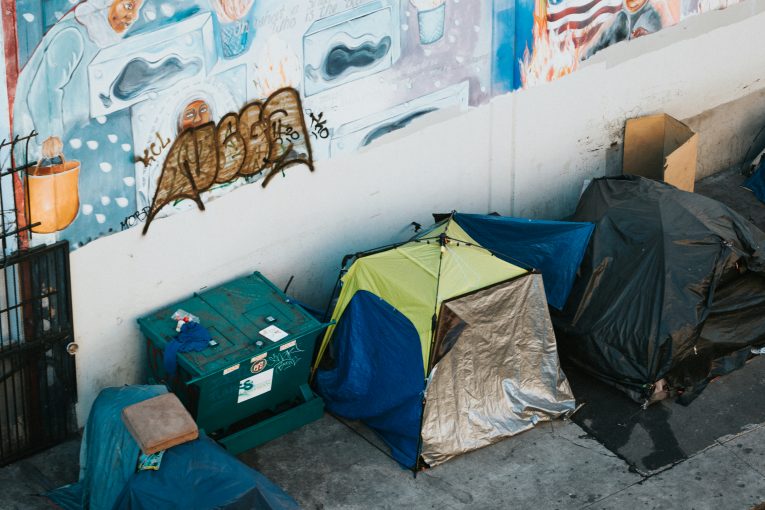

By David M. Greenwald
Executive Editor
Sacramento, CA – The headline in CalMatters caught my attention: “California lawmakers on both sides want to ban homelessness.”
But no. Senate GOP leader Brian Jones of San Diego and Democratic Sen. Catherine Blakespear of Encinitas don’t want to ban homelessness. They want to ban encampments.
Instead of dealing with the actual problem, they want to ban homeless encampments near “sensitive community areas” statewide.
Senate Bill 1011 would compassionately clear encampments by:
- Prohibiting encampments within 500 feet of sensitive community areas such as schools, open spaces, and transit stops. This will help protect our most vulnerable populations – children, seniors, and families.
- Prohibiting camping on sidewalks if a homeless shelter is available. This will help protect pedestrians’ need to utilize sidewalks for travel without unfairly inconveniencing homeless individuals.
- Requiring a 72-hour warning before an encampment sweep. This will give homeless individuals a chance to find alternatives and services before their encampment is cleared.
- Requiring enforcement officers to provide information about sleeping alternatives, homeless and mental health services, and/or homeless shelters in the area. This will help connect homeless individuals to desperately needed services as we
 compassionately clear encampments.
compassionately clear encampments.
“Californians should not have to tolerate the encampments that now fill our open spaces with trash, needles, and human waste,” said Senator Jones Jones. “We know that clearing encampments is possible when there is the political will to do so—just look at San Francisco during the APEC conference. It’s dangerous, inhumane, and unhealthy for homeless individuals to live on sidewalks, near our schools and transit stops, and in our open spaces. It’s also not safe or fair to nearby neighbors and local businesses. Our bipartisan SB 1011 will help compassionately clear encampments, clean up California, and protect public safety and health.”
He said, “California has spent $22 billion in the past six years on homelessness and what do we have to show for it? Nearly a 40% increase in homeless population…. Clearly California’s current approach to homelessness is failing and Californians are tired of it.”
Senator Blakespear added, “Public spaces are not living spaces. People deserve to live inside, and the public deserve to use their parks, sidewalks and streets as they were designed. This bill is a step toward creating that reality.”
Even Senator Dodd chimed in, “Solving the homelessness crisis is not a partisan issue and I’m happy to join with colleagues from both sides of the aisle to connect homeless people with services and get them shelter.”
But does this bill do anything?
The first thing that jumps out: “Prohibiting camping on sidewalks if a homeless shelter is available.”
That’s already the law. So there is no change there.
Jones claims that the goal is not “to criminalize homelessness.”
And there is something to that claim. It requires a 72-hour warning before an encampment sweep and it requires officers to provide information about sleeping alternatives, homeless and mental health services, and/or homeless shelters in the area.
But there’s a problem here. Part of that problem is that California lacks sufficient shelter for homeless people. And the other part of that problem is that connecting people to “desperately needed services” sounds good, but the bill does nothing about funding those services.
As Patricia Fontana wrote in CalMatters in November, “I have learned that you can’t solve homelessness without vastly improving our public mental health system. Without timely treatment and needed interventions, those with a serious mental illness deteriorate and lose housing. “
The LA Daily News last year reported, “Los Angeles’ politicians are currently laser-focused on the dire need for more permanent and temporary housing, while the pressing need for more mental health services draws comparatively less attention.”
They add that “even when funding is made available for homeless mental health professionals, organizations are often unable to find staff to file the roles.”
One problem: “There simply are not enough workers to provide mental health services in Los Angeles County. And the demand is at an all-time high.”
The LA Times editorial noted that the state auditor found “found the problem was with inadequate ongoing services, not the law. It’s as though California’s care infrastructure for mental health and substance use is a leaky and overcrowded canoe. It won’t help to add more passengers who don’t want to be there, as SB 43 would do. We’re going to need a bigger boat — and a better one.”
So forcing people off the streets into an inadequate mental health system that lacks the housing and resources is not going to solve homelessness. It’s simply going to shuffle the problem around and perhaps make it less visible to the average person.
Ironically, that could make the problem worse. Having these large encampments is a daily reminder that we have a crisis. Putting those encampments out of sight is putting them out of mind without actually solving the problem.







Municipalities need to manage these encampments because they cause health and safety issues. A significant percentage will not avail themselves of the services.
This is just irresponsible rhetoric. Increasing mental health services is a desirable goal, certainly. But it won’t “actually solve the problem.”
Unfortunately the GOP has become the party of “not my problem” and the first go to solution is to use force. That attitude just puts off the consequences for a bit longer.
We have a pretty good idea of at least one part of the solution–housing first. We don’t seem to have a good handle on the second part which is mitigating addiction caused by rising despair.